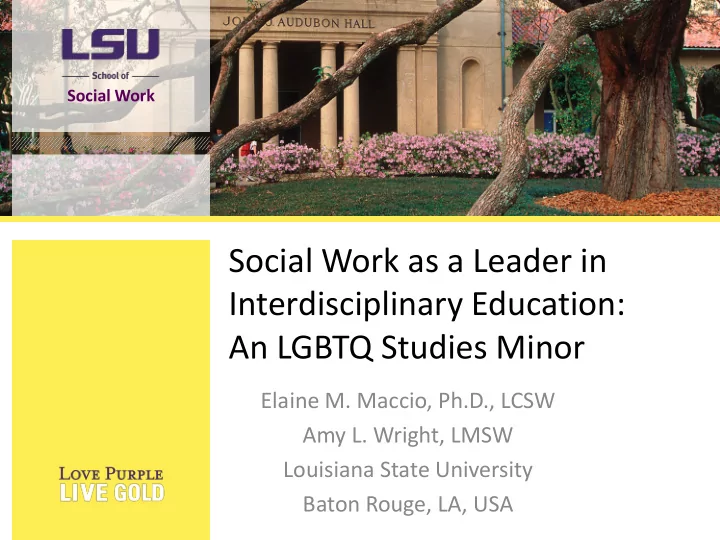

Social Work Social Work as a Leader in Interdisciplinary Education: An LGBTQ Studies Minor Elaine M. Maccio, Ph.D., LCSW Amy L. Wright, LMSW Louisiana State University Baton Rouge, LA, USA
Overview • Social justice expertise and diversity education leaders • Mutual benefit of interdisciplinary opportunities
Learning Goal & Objectives Goal : To promote social work leadership in interdisciplinary education • Obj. 1 : Articulate the value in having social work take a leadership role • Obj. 2 : Identify social work opportunities • Obj. 3 : Apply strategies for implementation
Background “[L]esbian and gay studies (or as it is also known, ‘queer studies’) is a minor growth industry , one of the very few fields to emerge in a shrinking academic job market. ” 1 1 Garber, L. (1994). Introduction. In L. Garber (Ed.), Tilting the tower: Lesbians, teaching, queer subjects . New York, NY: Routledge.
Background • Social sciences humanities 2 • Social work: social justice expertise, leader in diversity education • Think outside the social work box • Case example 2 Pottie, L. M. (1997). Cross-border shopping and niche marketing: Academic economies and lesbian and gay studies. College Literature, 24 (1), 183-193.
Methods • Proposed to the director an LGBTQ studies minor. • Develop an introductory course to determine student interest in such a topic. • Offered “Introduction to LGBTQ Studies” (19 students)
Methods • Proposed the minor: • writing a justification • developing a program description and a list of courses • obtaining permission from department chairs • Minor approved and added to the general catalog
Methods • 19 courses identified • 10+ departments represented October 2013: August 2014: Application Application to submitted to make January 2015: Fall 2015: January 2012: November make “Intro” a “Intro” a permanent Four courses “Intro” course LGBTQ Studies 2012: Gen Ed course; course and “LGBTQ added as minor- offered a third Minor proposed Course LGBTQ Studies Studies” a new eligible time (N = 39) to SW director approved Minor launched minor January 2013: October 2012: Fall 2014: November February 2015: September “Introduction to Application to add “Intro” course 2013: “Intro” 2015: 6 LGBTQ Studies “Introduction to Course and offered a approved as students offered as a LGBTQ Studies” as second time minor Gen Ed course; enrolled in special topics a special topics approved ( N = 19) 3 students minor course ( N = 19) course enrolled in minor
Results • LGBTQ Studies Minor introduced in fall 2014
Results • Core course • Spring 2013 (19) • Fall 2014 (19) • Fall 2015 (39) • Fall 2016 (50) • Core course made General Education eligible • Additional permanent and special topics courses
Results • Clause added to catalog • Student evaluations • Favorable publicity locally, regionally, and nationally
Conclusion • Impetus for LGBTQ studies minor: 1) Gap in the curriculum covering LGBTQ issues 2) Absence put the university behind the curve and at a competitive disadvantage • Benefits: 1) Exposure to a culture not previously covered, acknowledgement on their transcripts 2) University attractiveness and competitiveness 3) School gets credit and introduces students to social work
Contact Elaine M. Maccio, Ph.D., LCSW emaccio@lsu.edu Amy L. Wright, LMSW awrig13@lsu.edu
Recommend
More recommend